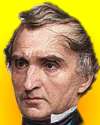
On 18 Apr 1873, Justus von Liebig died. Some readers may recall his name attached to the Liebig Condenser used in a distillation apparatus, but may otherwise be unaware of the many contributions this German chemist made in diverse fields.
He was also a great communicator for science to the public. The book of his first series of Familiar Letters on Chemistry met with rapid sales, going through two editions in England, a reprinting in America, and a translation into Italian.
From his follow-up second series, you can read an example of his popular writing on this chapter on the Nature of Decay. You may be startled to learn of the outcome of the discovery of the nature of decay of human remains at the Cemetery of the Innocents at Paris. But Liebig’s application of chemistry to the manufacture of beer and wine will be of more conventional interest.

On 18 Apr 1873, the German chemist Justus von Liebig died. He was not only a founding father of organic chemistry, but is notable as an influential teacher. He transformed scientific education, medical practice and agriculture. Today's book pick is: Justus von Liebig: The Chemical Gatekeeper (Cambridge Science Biographies), by William H. Brock, who provides a definitive biography of one of the most important figures in the history of chemistry. Chapters on farming, food chemistry, and the chemistry of sewage reveal a now little-known side of this remarkable researcher who understood the civic importance of his science in the modern world.
It is available from Amazon, typically about New from $54.33. Used from $61.39. (As of earlier time of writing - subject to change.)
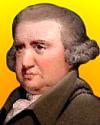 | So the horns of the stag are sharp to offend his adversary, but are branched for the purpose of parrying or receiving the thrusts of horns similar to his own, and have therefore been formed for the purpose of combating other stags for the exclusive possession of the females; who are observed, like the ladies in the times of chivalry, to attend to the car of the victor... The final cause of this contest amongst the males seems to be, that the strongest and most active animal should propagate the species, which should thence become improved. |
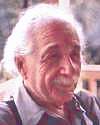 | I have little patience with scientists who take a board of wood, look for its thinnest part and drill a great number of holes where drilling is easy. |
 | A time will come, when fields will be manured with a solution of glass (silicate of potash), with the ashes of burnt straw, and with the salts of phosphoric acid, prepared in chemical manufactories, exactly as at present medicines are given for fever and goitre. |
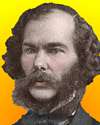 | Science is the systematic classification of experience. |
| Before you look at today's web page, see if you can answer some of these questions about the events that happened on this day. Some of the names are very familiar. Others will likely stump you. Tickle your curiosity with these questions, then check your answers on today's web page. | |
| Births | |
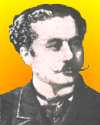 | Paul-Émile Lecoq de Boisbaudran, born 18 Apr 1838, was a French chemist who used spectroscopy to search minerals for new elements. The elements he found include samarium (1880), and dysprosium (1886). Another was the eka-aluminium predicted by Mendeleev between aluminium and indium. Boisbaudran named this new element in honour of France. What is the name Boisbaudran gave to eka-aluminium? |
| Deaths | |
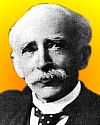 | Sir John Ambrose Fleming (1849-1945) was an English engineer who made numerous contributions to electronics. In 1904, he built an evacuated glass tube with a heated filament (cathode) and another electrode (anode). When the anode was positively biased, he discovered a one-way current as the electrons flowed only from filament to anode. What name did Fleming give this device? |
 | Albert Einstein, who died on 18 Apr 1955, was a German-American physicist who developed the special and general theories of relativity. Yet the Nobel Prize for Physics he was awarded in 1921 was for his earlier explanation of something quite different. For the explanation of what phenomenon was Eistein's Nobel Prize awarded? |
 | Erasmus Darwin, who died on 18 Apr 1802, was a prominent English physician, poet, philosopher, and naturalist. He formulated one of the first formal theories on evolution, with ideas about how competition and sexual selection could cause changes in species. Though Erasmus Darwin did not come up with the concept of natural selection, that approach came from Charles Darwin, a member of his family. What family relationship did Erasmus Darwin have to Charles Darwin? |
| Events | |
 | On 18 Apr 1950, an aircraft made a flight from Toronto, Canada, to New York City, which was the first of its kind for an international passenger flight. What about this aircraft made it the first of its kind for an international passenger flight? |
Fast answers for the previous newsletter for April 17: seas or maria • Love waves - a major type of earthquake waves propagated between the crust and underlying mantle • Benjamin Franklin • Surveyor 7 • the decade including the year 1964.
 If you enjoy this newsletter, the website, or wish to offer encouragement or ideas, please send feedback by using your mail reader Reply button.
If you enjoy this newsletter, the website, or wish to offer encouragement or ideas, please send feedback by using your mail reader Reply button. Your click on a Facebook, StumbleUpon, or other social button on the site webpages is also a welcome sign of appreciation. Thank you for using them.
© This newsletter is copyright 2020 by todayinsci.com. Please respect the Webmaster's wishes and do not put copies online of the Newsletter — or any Today in Science History webpage. (If you already have done so, please remove them. Thank you.) Offline use in education is encouraged such as a printout on a bulletin board, or projected for classroom viewing. Online, descriptive links to our pages are welcomed, as these will provide a reader with the most recent revisions, additions and/or corrections of a webpage. For any other copyright questions, please contact the Webmaster by using your mail reader Reply button.
--
If you do not want to receive any more newsletters, Unsubscribe
To update your preferences and to unsubscribe visit this link
Executive Real Estate Business Class
-
"It was like a man with wings. It wasn't like anything you'd see on TV or in a monster movie." ...
About the publisher
Search This Blog
Blog Archive
-
▼
2021
(585)
-
▼
April
(57)
- On This Day for April 30 - George Washington inaug...
- Newsletter for Friday 30 April.
- On This Day for April 29 - British royal wedding, ...
- Newsletter for Thursday 29 April.
- On This Day for April 28 - Benito Mussolini execut...
- Newsletter for Wednesday 28 April.
- On This Day for April 27 - Independence for Sierra...
- Newsletter for Tuesday 27 April.
- On This Day for April 26 - Chernobyl nuclear accid...
- Newsletter for Monday 26 April.
- On This Day for April 25 - Hubble Space Telescope ...
- See How They Tracked Down Bin Laden
- Newsletter for Sunday 25 April.
- On This Day for April 24 - Installation of Pope Be...
- Newsletter for Saturday 24 April.
- On This Day for April 23 - Voting for Eritrea's in...
- Earth Day Bonus: Become a Climate Action Expert
- On This Day for April 22 - First Earth Day, Miguel...
- On This Day for April 21 - French elections held, ...
- Newsletter for Wednesday 21 April.
- On This Day for April 20 - Explosion on the Deepwa...
- Newsletter for Tuesday 20 April.
- On This Day for April 19 - American Revolution beg...
- Newsletter for Monday 19 April.
- On This Day for April 18 - The midnight ride of Pa...
- Newsletter for Sunday 18 April.
- On This Day for April 17 - Canada Act proclaimed, ...
- Newsletter for Saturday 17 April.
- On This Day for April 16 - Harriet Quimby's flight...
- Newsletter for Friday 16 April.
- On This Day for April 15 - Sinking of the Titanic,...
- Newsletter for Thursday 15 April.
- On This Day for April 14 - Abraham Lincoln shot, J...
- On This Day for April 13 - Alfred Dreyfus imprison...
- Newsletter for Tuesday 13 April.
- On This Day for April 12 - Launch of first space s...
- Newsletter for Monday 12 April.
- John of Gaunt: father of England’s medieval monarchy
- On This Day for April 11 - Napoleon's abdication a...
- Newsletter for Sunday 11 April.
- On This Day for April 10 - Anschluss approved in A...
- On This Day for April 9 - Fall of Baghdad, Jørn Ut...
- Newsletter for Friday 9 April.
- On This Day for April 8 - Celebration of the Buddh...
- On This Day for April 7 - Jack Nicklaus's first Ma...
- Newsletter for Wednesday 7 April.
- On This Day for April 6 - Olympics revived, Raphae...
- On This Day for April 5 - Battle of Maipú, Colin P...
- The history and origins of Easter
- On This Day for April 4 - Martin Luther King, Jr.,...
- Newsletter for Sunday 4 April.
- On This Day for April 3 - Implementation of the Ma...
- Newsletter for Saturday 3 April.
- On This Day for April 2 - Death of Pope John Paul ...
- Newsletter for Friday 2 April.
- On This Day for April 1 - Creation of Nunavut, Ser...
- Newsletter for Thursday 1 April.
-
▼
April
(57)
-
Blogroll
-
About
HistoryFact










0 comments:
Post a Comment